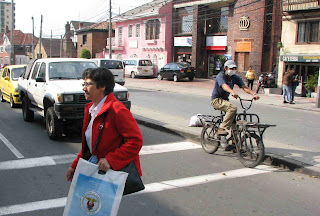 |
| Don't breathe deep: Cyclists on car-clogged Carrera 10. |
 |
| Smokin' - a belching Bogotá bus. |
But is it true here in Bogota?
 |
| Cyclists on a Cicloruta on Calle 13. |
Of course, this doesn't change cycling's great benefits for the city, in less pollution, traffic congestion and fuel consumption. And bicycling still reduces obesity and improves health in many ways, despite the pollution.
But I was disappointed by some of the comments other readers had left on the story, which criticized the academics for doing the study and the media for disseminating it 'Because it would discourage people from bicycling.'
 |
| A delivery cyclist wears a protective face mask. |
The solutions aren't complicated, altho they might be difficult to implement:
Newly-elected mayor needs to follow thru on his promise to create a London-style congestion charge for private vehicles. That would reduce congestion and pollution and provide more money for public transit.
 |
| A cyclist trapped by cars on Jimenez Ave. |
But, first and foremost, city officials need to enforce the law. EcoPetrol has promised to clean up Bogotá's gasoline and diesel fuels to international standards and officials must hold the company to its word. And EcoPetrol can afford to provide clean fuel for Colombia's capital city - the company earned record profits last year. Even more fundamentally, the city needs to enforce air pollution laws on vehicles and factories. Observation of many of Bogotá's cars, trucks and buses, some of which apparently run on coal, makes it obvious that pollution laws are a dead letter.
'Location of Ciclorutas can be damaging to health' - U.N. News Agency
Check out this video, in Spanish, denouncing pollution in Bogotá. (Video sobre contaminacion en Bogotá.)
No hay comentarios:
Publicar un comentario